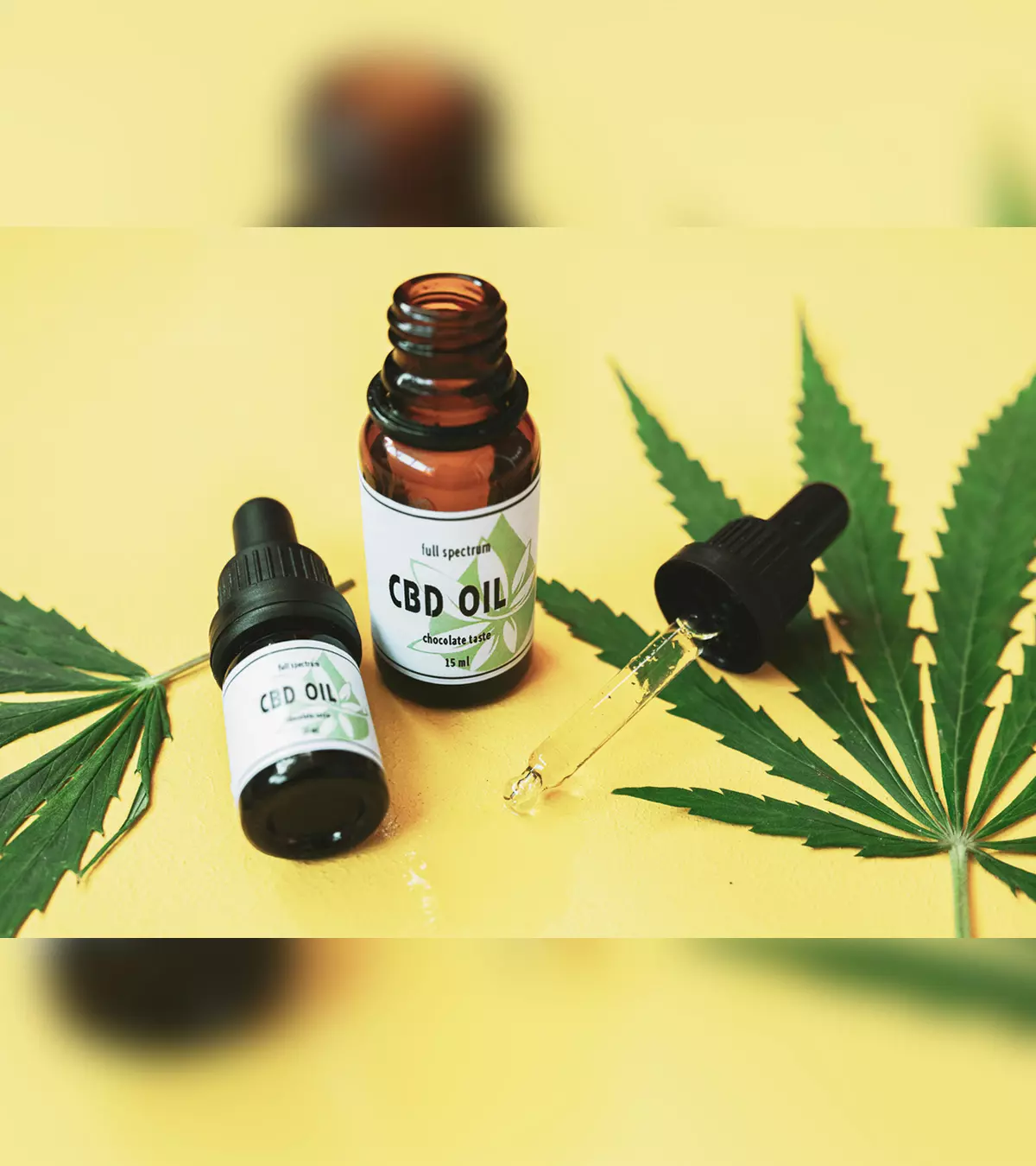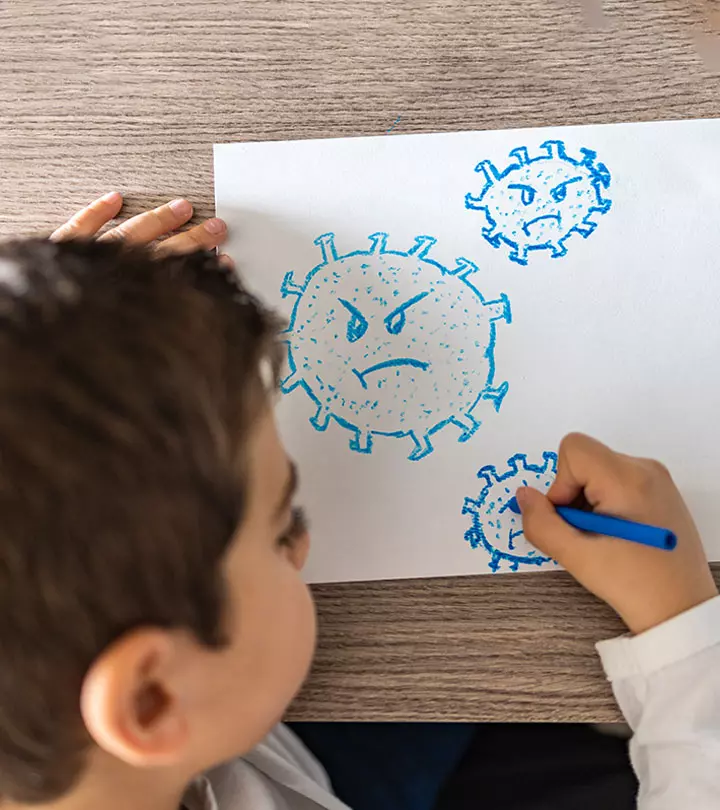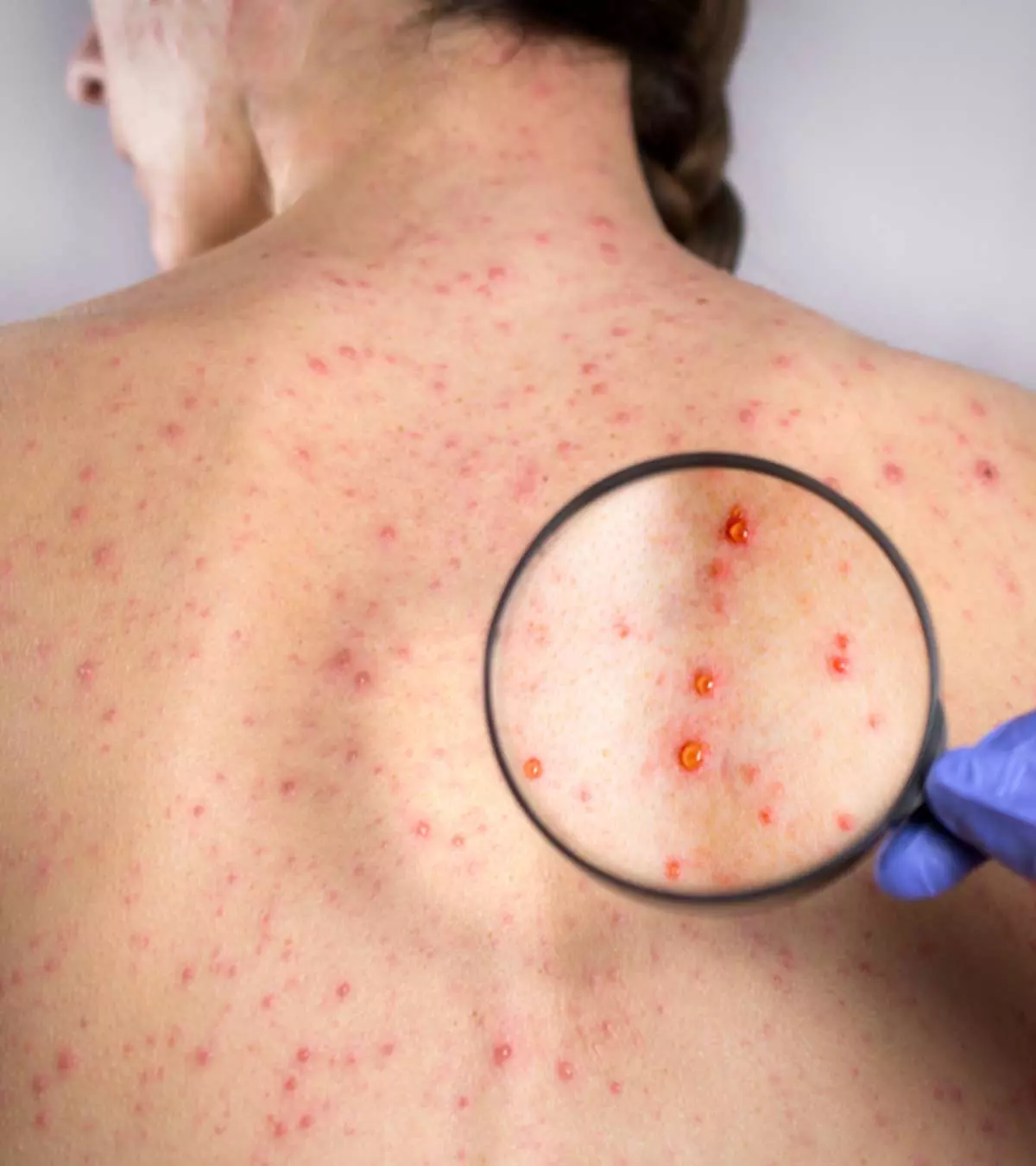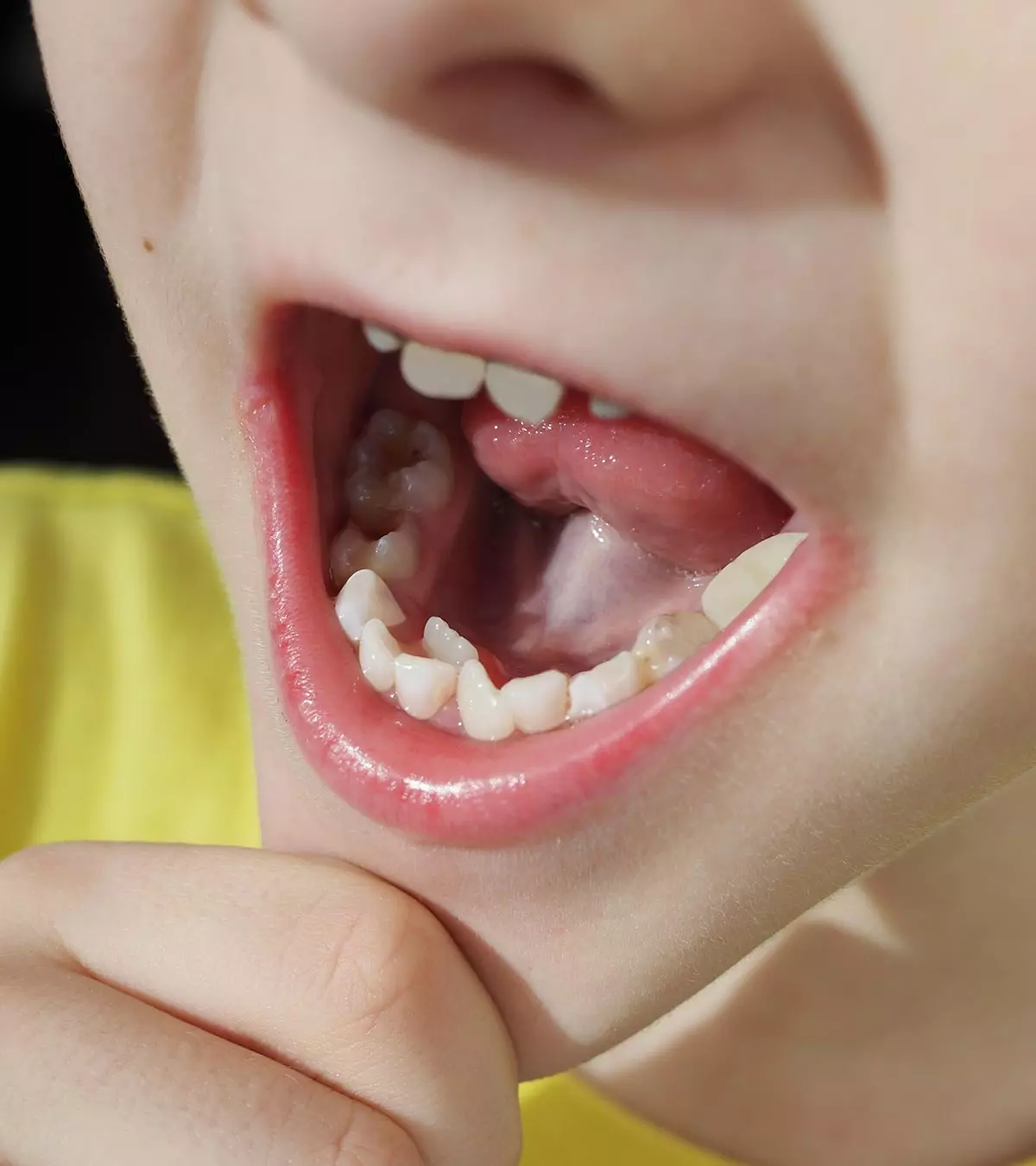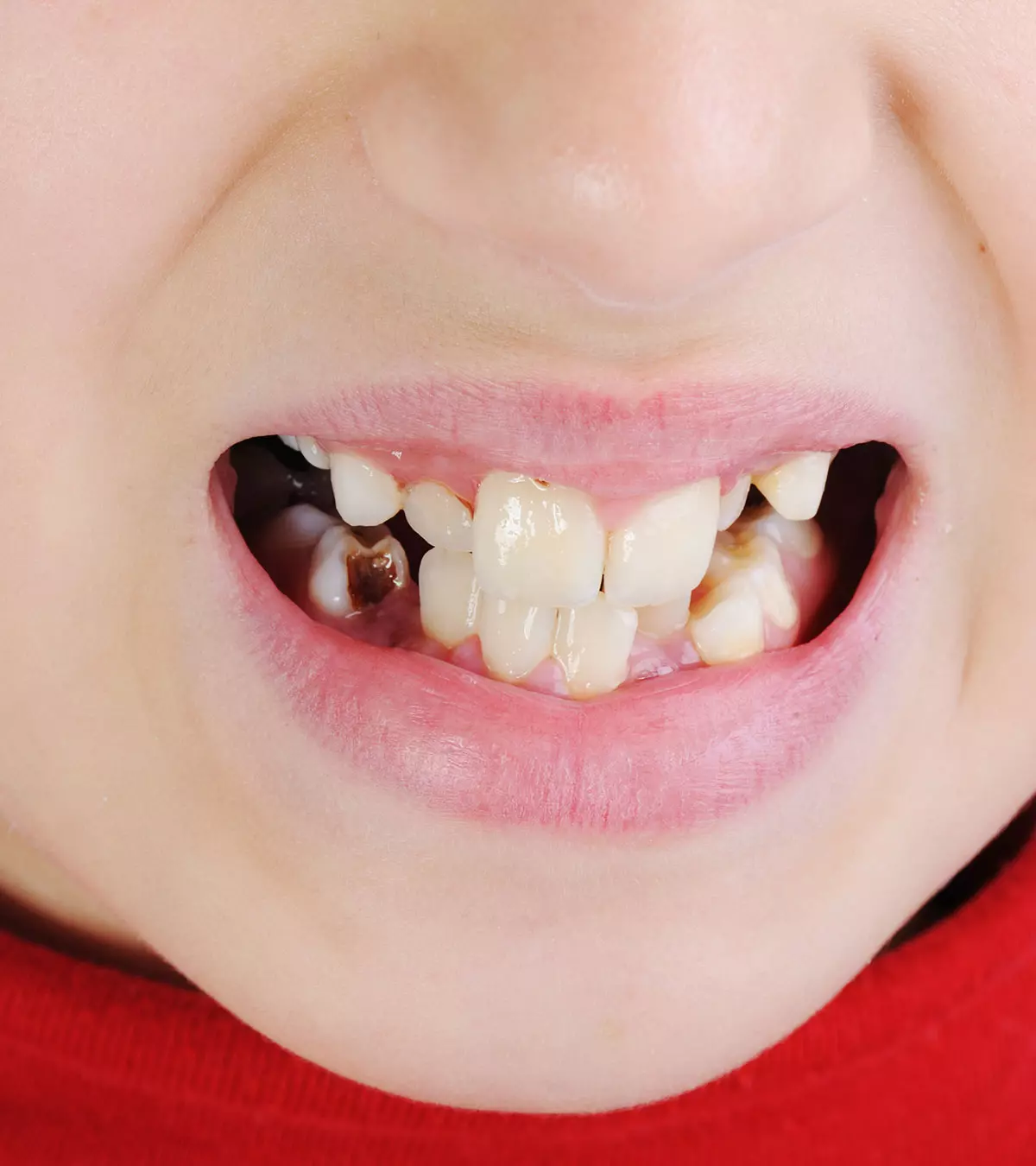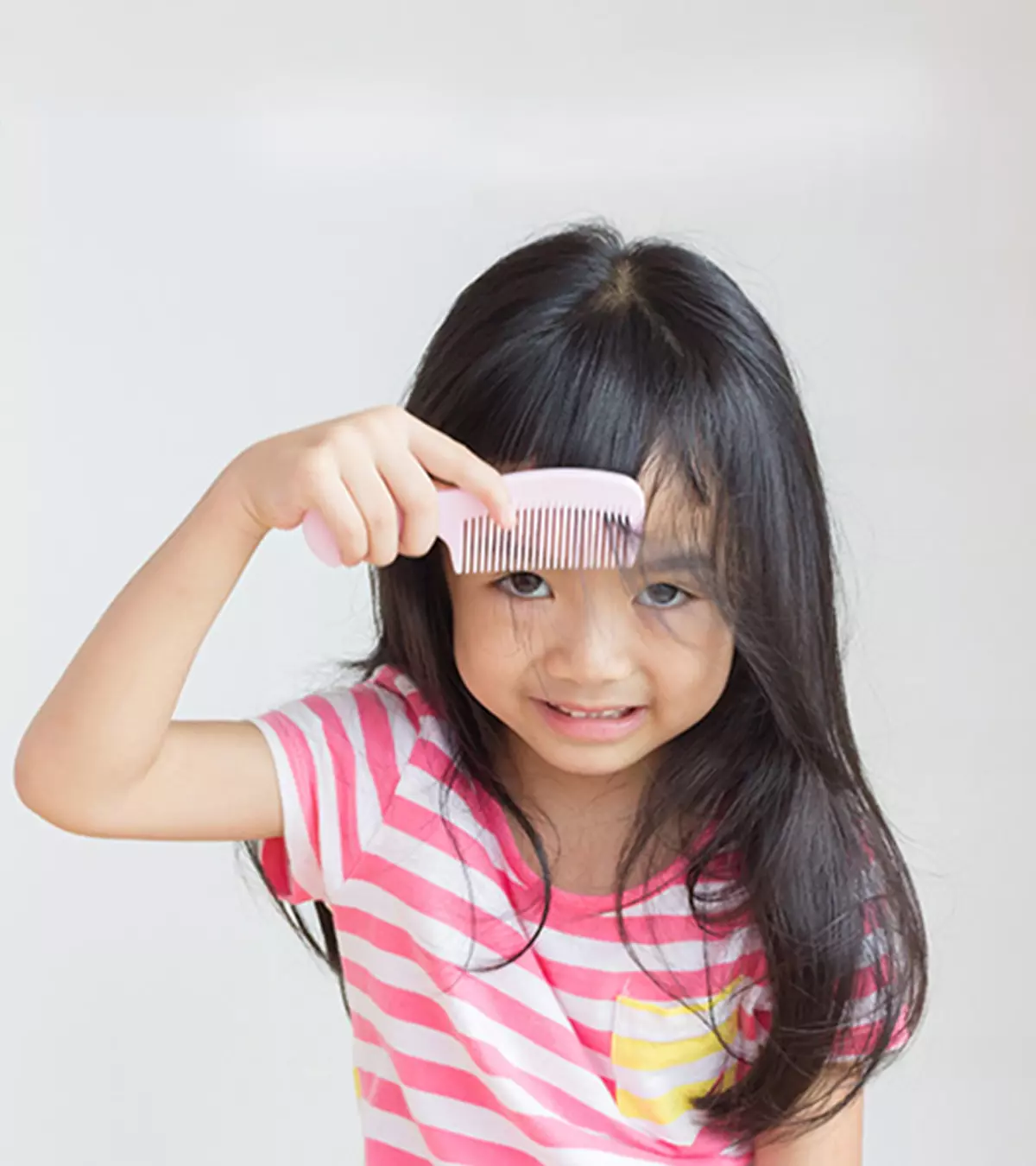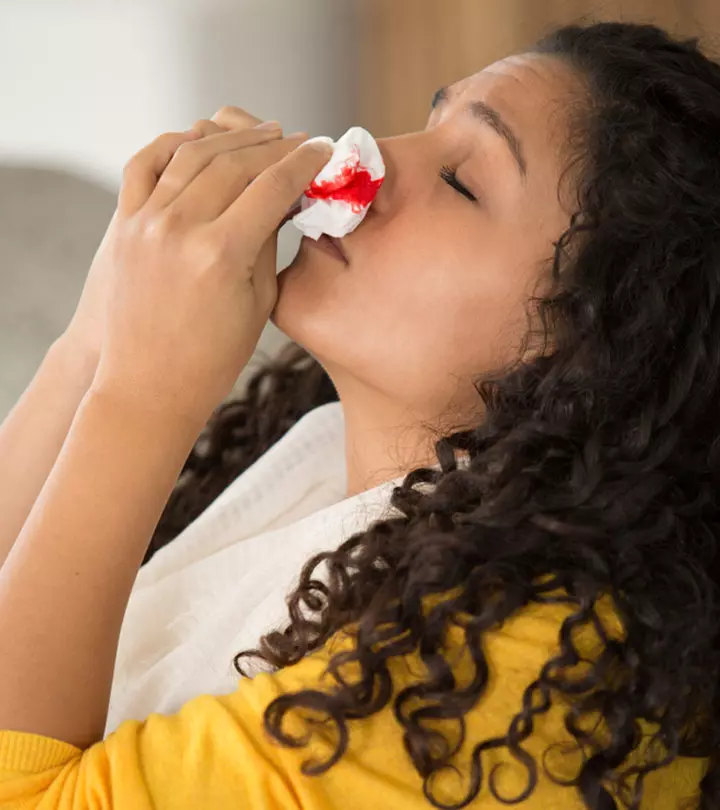
Image: ShutterStock
Nosebleeds, also called epistaxis, may look scary but are mostly harmless. The nose has blood vessels close to the external surface, so they get injured easily, causing blood to ooze out of one or both nostrils (1) (2). It is not uncommon to see nosebleeds in teenagers. Usually, these happen in winter or in climates that are too dry. Read this post to know the types, causes, treatment, prevention, signs you need to see a doctor, and tips on stopping nose bleeding in teenagers.

Key Pointers
- Nosebleeds are usually seen in teenagers during winters or dry weathers.
- Some allergies, injuries, dry air, infections, high blood pressure, and drug abuse may be the possible causes.
- Using an ice pack, maintaining an erect posture, or a slight pinch over the nostrils can stop the bleeding.
- However, frequent nose bleeding, intense injury, or breathing trouble must be immediately reported to the doctors for prompt care.
Types Of Nosebleeds
Depending on the site, from where the nose is bleeding, there are two types of nosebleeds in teens (3) (27) (28):
- Anterior nosebleeds are the most common type of nosebleeds and account for 90% of them. The bleeding originates from the front part of the nose, i.e., from the anterior nasal septum, which separates the nose into two sides. This nosebleed type could occur due to allergies, nose-picking, or dry air. Anterior nosebleeds are not severe in most cases and can be easily managed at home.
- Posterior nosebleeds come from deep parts and may be challenging to manage. They occur from the large or superior nasal cavity vessels at the back of the nose. Posterior nosebleeds may cause heavy bleeding, which may also flow down to the throat, thus requiring medical attention. High blood pressure, anticoagulant medications, airway obstruction, and trauma are some of the reasons for these bleeds.
Symptoms Of Nosebleeds In Teens
Studies suggest that the frequency of nosebleeds tends to be lower in teenagers (ages 12-17) than in younger children. In late teens, nosebleeds are uncommon (4). Nonetheless, recognizing the symptoms of nosebleeds can help you manage them properly. It also enables you to know when to see a doctor.
Here are some common symptoms to look for when experiencing a nosebleed (5):
- Blood coming from one or both nostrils.
- Blood flowing down the throat while lying down or tilting the head backward.
- A sensation of fluid running down the back of the throat.
- Pain or discomfort (if the nose is injured).
Causes Of Nosebleeds In Teenagers
Nosebleeds can occur due to various reasons. Understanding the underlying cause can help prevent and/or manage nosebleeds effectively. Here are the most common reasons related to anterior nosebleeds:
- Dry air: During dry climates or winter, the nasal passages may dry out, leaving the blood vessels fragile and prone to rupture. A ruptured blood vessel leads to nosebleeds (6). According to James E. Foy, an AOA board-certified pediatrician in Benicia, California, “A dry climate or heated indoor environment can contribute to drying out mucus membranes, leaving crusts inside the nose that itch and then bleed when picked (4).”
- Medicines: Nosebleed could be one of the side effects of allergies, cold medications, or using nasal sprays (7).
- Infections: Chronic inflammation, infections, and sinusitisiAn infection in which the tissues that line the sinus get swollen or inflamed (hollow, air-filled spaces in the skull). may also make the nasal tissue susceptible to bleeding (8).
- Injury: Picking the nose with fingernails or blowing too hard may damage the inside of the nose, thereby causing bleeding.
Some of the severe causes that may lead to both anterior and posterior nosebleeds are:
- Hypertension: Although rare, high blood pressure could be one of the reasons for nose bleeding (9).
- Accident or trauma: If a foreign body gets into the nose or if your nose is injured in an accident, then it may cause a nosebleed.
- Drug abuse: Frequent nosebleeds, along with other symptoms such as weight loss, dilated pupilsiA condition characterized by the dark part of the eye (pupils) being larger than usual. , and change in lifestyle, might be due to drug or alcohol consumption (10).

- Blood-related diseases: Nose bleeding can be a symptom of bleeding disorders and conditions or cancer such as leukemiaiA type of cancer that involves abnormal production of white blood cells in the blood and bone marrow. in teens (1) (11).
- Deviated septum: The tissue separating the nostrils gets deviated, leading to frequent nose bleeding (12). It is a less common condition.
 Quick fact
Quick factOccasional nosebleeds are not a cause of concern. You can try to stop it by taking some measures.
How To Stop Nosebleeds In Teenagers?
Most nosebleeds resolve on their own. However, knowing how to manage a nosebleed can help teenagers and parents stop the bleeding quickly and avoid potential complications. Here are some dos and don’ts that your child may follow to stop nose bleeding (13) (5):
Dos
- Sit up straight or stand upright.
- Lean forward and breathe through the mouth.
- Pinch nose slightly above nostrils for about 15 minutes. The pressure can stop the bleeding.
- Place an ice pack on the nose.

- Use a topical vasoconstrictoriAn external agent or drug that helps constrict blood vessels. .
Aaron LaRoche recounts his teenage struggles with nosebleeds and how he effectively managed them, “As a kid, I couldn’t stay out of my nose. From cramming things into them to seeing how far a finger could go, something about the olfactory bulb drew me. I had a lot of nosebleeds growing up. I’ve gathered some of my favorite ways to stop them – Tilting your head forward. This is a classic. I didn’t realize this was even a possibility till my teens when a friend showed me on an arid day. Pinching the nose between your fingers usually takes five to ten minutes to stop the bleeding. Also, decongestant sprays can clean and moisten the area and return it to a smooth nasal passage (i).”
Don’ts
- Do not lie down or do not tilt the head upside down or backward. This way, blood may go into the windpipe, resulting in choking or coughing.
- Do not put pressure on the nose after the bleeding has stopped.
 Point to consider
Point to consider- Do not stuff the nose with tissues, and do not blow the nose when it is bleeding.
- Do not poke or pick at the clot formed within the nostril after bleeding.
- Do not put a finger in the nose or blow nose for the next two to three days. “This could remove the clot and halt the blood vessels from healing,” says Dr. Foy (4).
Teens should avoid strenuous activities like outdoor sports and lifting heavy weights. They should also reduce the intake of hot beverages and food for 24 hours after bleeding (27). Most importantly, they should stay calm during a nosebleed, as being anxious can make bleeding worse.
When To See A Doctor?
According to the National Institutes of Health (NIH), approximately 60% of individuals have encountered a nosebleed at some point. However, only 10% are adverse enough to warrant medical attention (27). Consult a doctor, specifically an ENT specialist, if the adolescent has frequent nosebleeds. You should also seek medical guidance during the following circumstances (14):
- Nosebleeding is frequent and the condition does not resolve
- Bleeding often lasts for more than ten minutes
- Nosebleed due to an injury
- Unable to breathe

- A foreign object got into the nose
- Blood volume is too large
- Feeling too weak or dizzy
- Blood in gums, urine, or stool
- Unexplained bruising
Based on the diagnosis and symptoms, the doctor may suggest treatment options.
Treatment For Nosebleeds In Teenagers
If the nosebleed is due to some underlying condition, treatment for that problem will address nosebleeding too. In other cases, the most common management methods for nosebleeds in teens are (15) (16):
- Nasal packing: The doctor may use nasal sponges or ribbon gauzeiA sterile, soft, and highly absorbent dressing material used to absorb blood from wounds. to stop bleeding and accelerate clotting.
- Cauterization: It is a medical procedure in which the doctor may use an electric current, laser, or silver nitrate to burn the blood vessel that is bleeding.
- Medications: Based on the cause (such as high blood pressure), some teenagers may be prescribed medicines to control bleeding and pain.

- Surgical repair: In the case of a deviated septum or broken nose, a surgical procedure may be required. One method is arterial ligation, in which the blood vessel is tied to prevent bleeding.
The treatment of nosebleeds is carried out with the oversight of a doctor. As the adolescent grows, there is likely to be a complete resolution of nose bleeding with the help of treatment.
How To Prevent Nosebleeds In Teenagers?
Here are some tips to help prevent nosebleeds from happening (4) (14) (25):
- Wear protective gear (such as helmets) when playing to avoid injury to the nose.
- In the case of nasal irritation, cold or allergies, do not blow the nose forcefully. Do it gently so that the blood vessels don’t rupture.
- Don’t pick the nose too often.
- Cut the fingernails short to reduce the risk of scratching the delicate skin inside the nostrils.
- Use a humidifier in the room in case of dry air. At the same time, make sure to clean it from time to time as molds and germs may grow in it.
 Quick tip
Quick tip- Applying sprays, drops, or saline gels in the nostrils may help. Doctors may prescribe antibiotic ointment that can be applied in the nostrils.
- Avoid inappropriate or careless use of drugs.
- Avoid hot and spicy foods.
- Use nasal decongestants with caution as their overuse can also cause nosebleeds.
Remember, congestion or irritation could lead to nosebleeds. So, take your medications if you have known allergies. The risk of nosebleeds might be higher for those on medications like warfarin and NSAIDs. Promptly consult your doctor if you experience frequent nosebleeds while on these medications (28).
Frequently Asked Questions
1. Can stress cause nosebleeds in teenagers?
Though more common in adults, high blood pressure may cause nosebleeds in teens. Prolonged stress may be linked to increased blood pressure in children and hence may be indirectly related to nosebleeds (17) (18).
2. Can hormonal changes cause nosebleeds?
Yes, nosebleeds may be caused by hormonal changes, especially in girls (19).
3. Can an iron deficiency cause nosebleeds in teenagers?
Iron deficiency anemia might be associated with a low blood platelet count condition called thrombocytopenia. Teenagers with thrombocytopenia may experience nosebleeds. Blood tests may help doctors confirm the diagnosis (20) (21).
4. Can nosebleeds be caused by anxiety?
Hereditary hemorrhagic telangiectasia (HHT) is characterized by frequent and severe nosebleeds. Moreover, depression and anxiety are highly prevalent in HHT patients, which may exhibit an association between nosebleeds and anxiety (22).
5. Can diet affect the frequency of nosebleeds in teenagers?
Certain foods, including those high in salicylates (chocolate, coffee, spices, and certain fruits), natural antiplatelet substances (ginger, garlic, ginkgo biloba, and ginseng), and omega-3 acids (salmon and oily fish), have been linked to increased susceptibility to nosebleeds in HHT (23). Limiting these foods and substances may help reduce nosebleed occurrences in susceptible teenagers.
6. Can lifestyle changes help reduce the frequency of nosebleeds in teenagers?
Incorporating lifestyle changes may effectively decrease the occurrence of nosebleeds in teenagers. Avoiding alcohol and cigarettes and any form of substance abuse is essential as these habits heighten the risk of nosebleeds (23). Eating a balanced diet rich in nutrients helps maintain adequate nutrient levels, a lack of which may result in frequent nosebleeds. Additionally, managing conditions like hypertension through healthy eating habits and regular exercise may further help in reducing the frequency of nosebleeds.
Nosebleeds occur due to the rupture of thin blood vessels inside the nose. Most of the incidences of nosebleeds in teens do not have serious causes. Dry air, other weather conditions, injuries, or infections are the common ones. In rare cases, nosebleeds may indicate increased blood pressure or blood clotting disorders. Knowing the right first aid can help resolve the issue. However, seek immediate medical attention if nosebleeds become too frequent, are due to an injury, or are causing substantial blood loss. Treatment for the underlying condition or surgical correction may be suggested depending on the causative factor.
Infographic: How To Stop Nosebleeds In Teenagers?
Nosebleeds in teens are common and can be due to various factors, including dry air, infections, or an injury. In most cases, nosebleeds can be treated at home, as explained in the infographic below. However, if the bleeding persists or is accompanied by other symptoms, seek medical attention. Illustration: Momjunction Design Team
Illustration: Nosebleeds In Teenagers: Causes Treatment & Prevention

Image: Stable Diffusion/MomJunction Design Team
Obtain valuable knowledge on how to effectively address and avoid nosebleeds in children. Get concise and user-friendly tips to safeguard your child’s well-being and maintain their optimal health.
Personal Experience: Source
MomJunction articles include first-hand experiences to provide you with better insights through real-life narratives. Here are the sources of personal accounts referenced in this article.
i. Ways to stop nosebleeds;https://aaronlaroche.medium.com/ways-to-stop-nose-bleeds-6c174fdffe6c
References
- Nosebleeds.
https://familydoctor.org/condition/nosebleeds/ - Nosebleed (Epistaxis) in Children.
https://www.cedars-sinai.org/health-library/diseases-and-conditions—pediatrics/n/nosebleed-epistaxis-in-children.html#:~:text=Nosebleeds%20can%20be%20caused%20by%20many%20things%2C%20such%20as%20dry,or%20lean%20their%20head%20back. - What To Know About Nosebleeds.
https://doctorsthatdo.osteopathic.org/nosebleeds - Flora Yan et al; (2025); Age Distribution of Epistaxis in Outpatient Pediatric Patients.
https://journals.sagepub.com/doi/full/10.1177/01455613231207291 - Nosebleed (Epistaxis) in Children.
https://www.stanfordchildrens.org/en/topic/default?id=nosebleed-epistaxis-in-children-90-P02055 - Is My Nosebleed The Result Of Winter Air?
https://www.health.harvard.edu/diseases-and-conditions/is-my-nosebleed-the-result-of-winter-air - Nosebleeds.
https://www.nationwidechildrens.org/conditions/nosebleeds - Nosebleeds (Epistaxis).
https://www.hopkinsmedicine.org/johns-hopkins-childrens-center/what-we-treat/specialties/otolaryngology - Hypertension (High Blood Pressure).
https://kidshealth.org/en/teens/hypertension.html - How to Spot the Signs of Teenage Substance Use.
https://www.hazeldenbettyford.org/articles/warning-signs-teen-substance-use - Leukaemia.
https://www.teenagecancertrust.org/information-about-cancer/leukaemia - Deviated Septum.
https://www.health.harvard.edu/a_to_z/deviated-septum-a-to-z - Nosebleed.
https://www.nhs.uk/conditions/nosebleed/ - Nosebleeds.
https://www.chop.edu/conditions-diseases/nosebleeds-epistaxis - Nosebleeds (Epistaxis).
https://www.childrensmn.org/educationmaterials/childrensmn/article/15507/nosebleeds-epistaxis/ - Epistaxis (nosebleed).
https://www.cirse.org/patients/general-information/medical-conditions/epistaxis-nosebleed/ - Nosebleed (epistaxis).
https://www.childrens.health.qld.gov.au/health-a-to-z/nosebleed-epistaxis/ - How To Help Children And Teens Manage Their Stress.
https://www.apa.org/topics/children/stress - Nosebleeds.
https://extrapelvicnotrare.org/nosebleeds/ - Mahmoud S. Eisa et al; (2025); Thrombocytopenia Secondary To Iron Deficiency Anemia Responding To Iron Therapy.
https://www.ncbi.nlm.nih.gov/pmc/articles/PMC8299085/ - Anemia symptoms.
https://www.aamds.org/diseases/aplastic-anemia/symptoms - Shruti Chaturvedi et al; (2017); Depression And Post-Traumatic Stress Disorder In Individuals With Hereditary Hemorrhagic Telangiectasia: A Cross-Sectional Survey.
https://www.ncbi.nlm.nih.gov/pmc/articles/PMC5420428/ - B Maneesha Silva et al; (2013); Lifestyle And Dietary Influences On Nosebleed Severity In Hereditary Hemorrhagic Telangiectasia.
https://pubmed.ncbi.nlm.nih.gov/23404156/ - Chronic Nosebleeds in Children: What To Do.
https://www.healthychildren.org/English/health-issues/conditions/ear-nose-throat/Pages/Chronic-Nosebleeds-What-To-Do.aspx - Nosebleed.
https://www.nhsinform.scot/illnesses-and-conditions/ears-nose-and-throat/nosebleed - Nosebleeds.
https://www.rch.org.au/kidsinfo/fact_sheets/Nosebleeds/ - Ayesha Tabassom and Julia J. Dahlstrom; (2025); Epistaxis.
https://www.ncbi.nlm.nih.gov/books/NBK435997/ - Nosebleed (Epistaxis).
https://my.clevelandclinic.org/health/diseases/13464-nosebleed-epistaxis
Community Experiences
Join the conversation and become a part of our nurturing community! Share your stories, experiences, and insights to connect with fellow parents.
Read full bio of Dr. Sameh Mahmoud Shehata
Read full bio of Dr. Ritika Shah
Read full bio of Swati Patwal
Read full bio of Ghazia Shah






